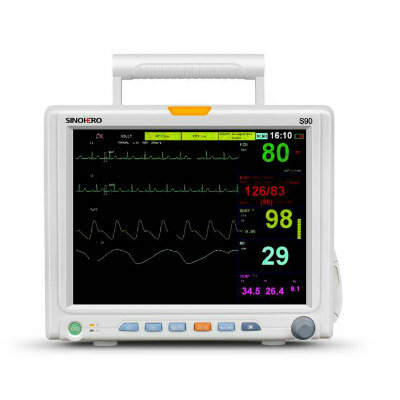AI Model Could Use ECG Tests to Detect Premature Aging and Cognitive Decline
|
By HospiMedica International staff writers Posted on 25 Feb 2025 |

Stroke can accelerate age-related cognitive decline, impacting an individual's quality of life and daily functioning. An electrocardiogram (ECG) records the electrical activity of the heart, with each beat generating an electrical impulse, or "wave," that travels through the heart. According to preliminary findings of a study presented at the American Stroke Association’s International Stroke Conference 2025, ECGs, combined with an artificial intelligence (AI) model, may eventually help detect signs of premature aging and cognitive decline.
Researchers at UMass Chan Medical School (Worcester, MA, USA) have developed an AI model, referred to as a deep neural network (DNN), designed to estimate individuals’ biological age—reflecting the age of their body’s cells and tissues—using ECG data. Unlike chronological age, which counts the number of years a person has lived, ECG-age provides an assessment of the heart’s functional health and potentially the overall condition of the body at the tissue level, offering valuable insights into aging and health. Previous studies have shown that ECG-age can predict the likelihood of heart disease and mortality. However, prior to this new study, the link between ECG-age and cognitive decline was not well understood.
The researchers analyzed data from over 63,000 participants in the UK Biobank, a large-scale ongoing study that includes more than 500,000 volunteers from the UK, all of whom enrolled between the ages of 40 and 69. Participants completed a variety of cognitive tests, which were analyzed in relation to their ECG testing, ensuring the cognitive data reflected the participants' mental status at the same time their ECG-age was calculated. Based on comparisons between actual ages and ECG-age, participants were categorized into three groups: normal aging, accelerated ECG-aging (those with an ECG-age older than their chronological age), and decelerated ECG-aging (those with an ECG-age younger than their chronological age). The findings revealed that individuals in the accelerated ECG-aging group performed worse on 6 of the 8 cognitive tests, while those in the decelerated ECG-aging group performed better on 6 of the 8 cognitive tests, compared to those with normal aging based on their ECG-age.
“There is a lot of ECG-data available for stroke treatment and I encourage health care professionals to use this data to look for signs of cognitive decline. Doing so may help with early diagnosis and timely intervention,” said Bernard Ofosuhene, B.A., lead author of the study and clinical research coordinator in the department of medicine at the UMass Chan Medical School.
Latest Critical Care News
- AI Eye Scans Could Help Identify Heart Disease and Stroke Risk
- Digital Heart Twin Improves Diagnosis and Treatment of Cardiac Arrhythmias
- First-Of-Its-Kind AI-Powered Probability Scoring System Assesses Heart Failure with Preserved Ejection Fraction
- AI-Assisted Colonoscopy Detects More Polyps but Has Modest Effect on Cancer Risk
- Wearables Could Reduce Need for Continuous Blood Thinners in Patients with Atrial Fibrillation
- AI Model Provides Real-Time Sepsis Risk Alerts for Improving ICU Patient Survival
- AI Algorithm Improves Intravenous Nutrition for Premature Babies
- Smart Mirror Generates AI-Powered Health Insights by Analyzing Facial Blood Flow
- Painless Diabetes Patch to Replace Needle Pricks

- Sensory T-Shirt Monitors Patient’s Vitals After Urological Surgery for Cancer
- Super-Sensitive Radar Technology Warns of Serious Heart Issues
- Thermal Imaging Could Accurately Track Vital Signs for Early Disease Detection
- New Microfluidic Device Improves Safety of Leukemia Treatment for Children
- Precision Transfusion Approach Improves Outcomes in TBI Patients
- Predictive Model for Daily Risk Alerts in Sepsis Patients Enables Early Intervention
- Novel Technology Measures Intracranial Pressure More Accurately and Non-Invasively
Channels
Artificial Intelligence
view channel
Innovative Risk Score Predicts Heart Attack or Stroke in Kidney Transplant Candidates
Heart researchers have utilized an innovative risk assessment score to accurately predict whether patients being evaluated for kidney transplants are at risk for future major cardiac events, such as a... Read more
AI Algorithm Detects Early-Stage Metabolic-Associated Steatotic Liver Disease Using EHRs
Liver disease, which is treatable when detected early, often goes unnoticed until it reaches advanced stages. Metabolic-associated steatotic liver disease (MASLD), the most prevalent form of liver disease,... Read moreSurgical Techniques
view channel
New Transcatheter Valve Found Safe and Effective for Treating Aortic Regurgitation
Aortic regurgitation is a condition in which the aortic valve does not close properly, allowing blood to flow backward into the left ventricle. This results in decreased blood flow from the heart to the... Read more
Minimally Invasive Valve Repair Reduces Hospitalizations in Severe Tricuspid Regurgitation Patients
The tricuspid valve is one of the four heart valves, responsible for regulating blood flow from the right atrium (the heart's upper-right chamber) to the right ventricle (the lower-right chamber).... Read morePatient Care
view channel
Portable Biosensor Platform to Reduce Hospital-Acquired Infections
Approximately 4 million patients in the European Union acquire healthcare-associated infections (HAIs) or nosocomial infections each year, with around 37,000 deaths directly resulting from these infections,... Read moreFirst-Of-Its-Kind Portable Germicidal Light Technology Disinfects High-Touch Clinical Surfaces in Seconds
Reducing healthcare-acquired infections (HAIs) remains a pressing issue within global healthcare systems. In the United States alone, 1.7 million patients contract HAIs annually, leading to approximately... Read more
Surgical Capacity Optimization Solution Helps Hospitals Boost OR Utilization
An innovative solution has the capability to transform surgical capacity utilization by targeting the root cause of surgical block time inefficiencies. Fujitsu Limited’s (Tokyo, Japan) Surgical Capacity... Read more
Game-Changing Innovation in Surgical Instrument Sterilization Significantly Improves OR Throughput
A groundbreaking innovation enables hospitals to significantly improve instrument processing time and throughput in operating rooms (ORs) and sterile processing departments. Turbett Surgical, Inc.... Read moreHealth IT
view channel
Printable Molecule-Selective Nanoparticles Enable Mass Production of Wearable Biosensors
The future of medicine is likely to focus on the personalization of healthcare—understanding exactly what an individual requires and delivering the appropriate combination of nutrients, metabolites, and... Read more
Smartwatches Could Detect Congestive Heart Failure
Diagnosing congestive heart failure (CHF) typically requires expensive and time-consuming imaging techniques like echocardiography, also known as cardiac ultrasound. Previously, detecting CHF by analyzing... Read morePoint of Care
view channel
Handheld, Sound-Based Diagnostic System Delivers Bedside Blood Test Results in An Hour
Patients who go to a doctor for a blood test often have to contend with a needle and syringe, followed by a long wait—sometimes hours or even days—for lab results. Scientists have been working hard to... Read more
Smartphone-Enabled, Paper-Based Quantitative Diagnostic Platform Transforms POC Testing
Point-of-care diagnostics are crucial for public health, offering rapid, on-site testing that enables prompt diagnosis and treatment. This is especially valuable in remote or underserved regions where... Read moreBusiness
view channel
Expanded Collaboration to Transform OR Technology Through AI and Automation
The expansion of an existing collaboration between three leading companies aims to develop artificial intelligence (AI)-driven solutions for smart operating rooms with sophisticated monitoring and automation.... Read more

















